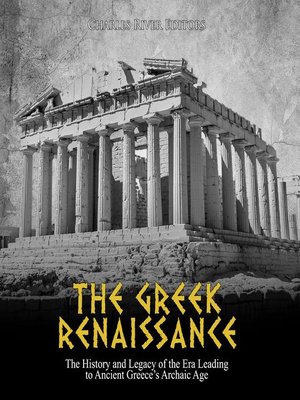The Greek Renaissance
audiobook (Unabridged) ∣ The History and Legacy of the Era Leading to Ancient Greece's Archaic Age
By Charles River Editors

Sign up to save your library
With an OverDrive account, you can save your favorite libraries for at-a-glance information about availability. Find out more about OverDrive accounts.
Find this title in Libby, the library reading app by OverDrive.



Search for a digital library with this title
Title found at these libraries:
| Library Name | Distance |
|---|---|
| Loading... |
The Greek Dark Ages, sometimes referred to as the Homeric Age or the Geometric Period, spans the era of Greek history from the end of the Mycenaean civilization around 1100 BCE and the emergence of the Greek poleis in the 9th century BCE. It is an era that has provided little in terms of extant archaeological evidence, which in part explains the name "Dark Ages," but this lack of evidence has led some archaeologists and historians to make the very great assumption that little of any real significance occurred during these 200 years. Instead, they view it as a sort of hiatus between the collapse of the Mycenaean culture and the emergence of Archaic Greece. As with other so-called "Dark Ages," this assessment is simplified, and an absence of evidence should never be assumed as evidence of absence. While these two centuries were indeed a period of transition, they included events and developments that were specific to the time, most notably the development of iron for weaponry, and many of these developments were highly significant in the subsequent evolution of Archaic Greece. After all, it's crucial to keep in mind that places like Athens and Sparta were inhabited throughout this time, and the impact of the Minoans, Mycenaeans, and others shaped their futures.
This laid the groundwork for the Greek Renaissance. In the 8th century, the Greek alphabet developed and the earliest surviving Greek literature was composed, while in terms of art and architecture, sculptures and red-figure pottery began. Warfare changed significantly as well when the hoplite became the core infantry. Put simply, none of these developments could have occurred if the basis for these changes had not been secured during what came to be known as the Greek Renaissance, which bridged the gap between the Dark Ages and Archaic Greece.







